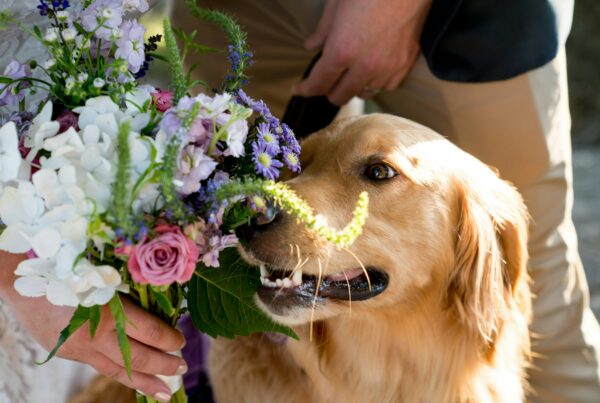Professional dog walking has grown rapidly over the last ten years, and the collapse of the economy has sent a new flood of dog lovers into the field. Because walking is a young business, there is currently no regulating body and anybody who wants to go into the business can hang out a shingle.
But walking dogs, particularly in groups, takes more than the passion we all share for them. There is specialized knowledge and skill that walkers should possess to ensure the safety of the dogs in their charge, as well as themselves and the other dogs and humans who share the beaches, trails, and parks.
To make sure the dog walker you hire is qualified, do a careful interview that includes the following questions.
1. Are you trained in canine learning theory, body language, and pack management?
You want a dog walker who knows how to: a) use scientifically sound, humane training methods; b) read body language and take appropriate steps to prevent fights (and properly break them upwhen need be); c) judge which dogs to place together for maximum compatibility; and 4) handle issues like quarrels over toys, space, or play styles. In short, you want someone with professional knowledge and the skill set to keep the group together and under control while everyone has a great time. Of course, a love of dogs is imperative — but not enough on its own. (Full disclosure: dogTEC’s Dog Walking Academy trains and certifies dog walkers in all this and more. As it is currently the only educational program to do so, we obviously recommend hiring a dogTEC-certified dog walker.)
2. How many dogs do you walk at once?
Some cities, counties, and park districts now regulate the number of dogs a walker can take out together. But most do not. This means that some walkers are escorting six or eight dogs, while others are walking as many as 15 and even 20. Together. In public spaces. Whether on or off leash, each dog added to a group increases the potential for conflict, injury, lost dogs, and distraction – not to mention making individual attention pretty much impossible. Your dog deserves to be one of few rather than one of many. (dogTEC-certified walkers can walk no more than eight dogs to maintain their certification status.)
3. Do you walk alone?
A walker’s job is to keep your dog safe and show her a good time. This means keeping vigilant focus. Teaming up with a friend can be fun, but it inevitably reduces attention. If that friend is also a dog walker, going out together combines two sets of dogs, making the pack too large for maximum safety. For best results, a dog walker should hit the trail with dogs, not other people. For similar reasons, cell phones and other potentially distracting devices should be turned off during dog walks.
4. Who will actually walk my dog?
Most dog walking companies are very small — the sole proprietor is the sole walker. Some have multiple employees, however. Find out whether the person who comes to meet you and your dog will be your actual dog walker. If not, ask about that person’s qualifications, too, and how she will be introduced to your dog. You may request to meet the walker yourself, if you prefer.
5. What size dogs do you walk together?
If you have a small dog, insist that your dog walk only with other dogs her size. If you have a large pooch, do the same. It’s too easy for small dogs to be injured during the course of play with and among their larger peers. And the risk of predatory drift, in which one dog attacks and even kills another, is much higher than is generally realized. This tragedy can — and most commonly does — happen between dogs who know each other and generally get along well, even for years. It’s safest to stick to the 50% rule. For example, if your dog weighs 30 pounds, his playmates should weigh no more than 60 pounds.
6. How much time do you guarantee on the walk?
If your walker will be transporting your dog, make sure that the time quoted to you is time out of the vehicle, roaming and having fun. The car ride shouldn’t be included. And make sure your walker is giving Missy her full due. Too many walkers load the pack back into the van after only 15 to 20 minutes of play, when the brochure says play sessions are 60 minutes long.
7. What kind of training methods and equipment do you use?
The American Veterinary Medical Association, American Society for the Prevention of Cruelty to Animals, and The SF/SPCA all recommend hiring only positive-reinforcement based dog trainers. Use the same principles when choosing a dog walker. Your walker should know how to keep a group of dogs under control and safe without the use of choke, prong, and shock collars; citronella or water spray; hitting, shoving, or yelling. Your dog is supposed to have a good time out there. You wouldn’t let a teacher spank your child. A professional walker shouldn’t need to resort to such measures, either.
8. Are you licensed, insured, and bonded?
Any walker using the word “professional” should carry dog-walking insurance and have a business license. All employees of a given company should be bonded.
9. Do you have a professional service contract and references?
You should be asked to sign a contract. Read it thoroughly, and feel comfortable asking for references. Then check them!
10. Are you certified to provide canine first aid, and what are your emergency protocols?
What will your walker do if your dog is injured? What will be done with your dog if another dog in the group is hurt and requires the walker’s full attention? What about if the vehicle breaks down, if a dog is lost, or if a natural disaster occurs? Does the person carry emergency information and know the fastest route to the emergency veterinary clinic? In short, is he or she prepared? If you don’t ask, you won’t know.
We are currently seeing an explosion of dog walkers and dog-walking companies. Most do an outstanding job caring for the dogs in their charge, providing them with the outdoor recreation and canine companionship they need to truly thrive. If you take the time to carefully choose the right walker for your dog, one that can answer the above questions fully and confidently, you can rest assured that your dog is having a fun and safe time when you need to be away all day. Your dog deserves that, and you do, too.
Veronica Boutelle, MA, CTC, is the founder of dogTEC and previously the Director of Behavior and Training for the San Francisco SPCA. She is the author of How to Run A Dog Business: Putting Your Career Where Your Heart Is, and is a sought-after lecturer in the professional dog world. She is one of several Dog Walking Academy instructors. For more information, visit www.dogtec.org.
This article was written by Veronica Boutelle and taken from dogwalker.com



